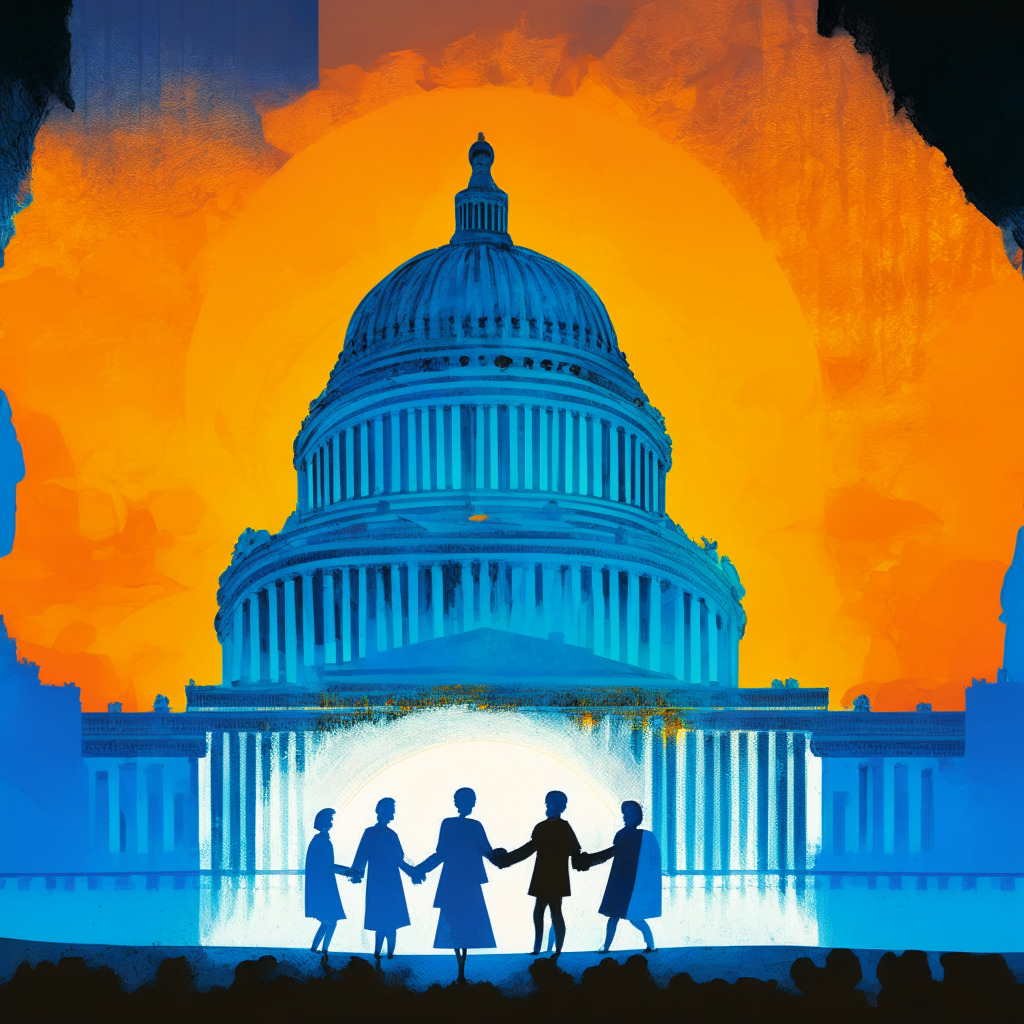The U.S. House of Representatives is considering the introduction of a Central Bank Digital Currency (CBDC), amidst contrasting views. Democrat Rep. Stephen Lynch calls for a pilot project for a digital dollar, stressing it is “absolutely critical” for the U.S. to show leadership in digital currency development. However, concerns remain regarding transaction management, tracking, and potential regulatory limitation issues.
Search Results for: U.S. House of Representatives
AI Partnerships: Unveiling the U.S.-Vietnam Collaborations-Skeletons or Springboards?
U.S. and Vietnam solidify ties through business partnerships focused on AI technologies, cloud computing and semiconductors. Industry giants like Google, Intel, Microsoft, and Nvidia support this initiative, signaling Vietnam’s shift from economic centralization to a more open approach.
U.S. Crypto Regulation: Balancing Innovation and Compliance in the Blockchain Era
“The U.S Congress moved closer to regulatory clarity with two crypto-related bills: the Financial Innovation and Technology for the 21st Century Act, aimed at crypto company registrations, and the Blockchain Regulatory Certainty Act, aiming to cut down barriers for blockchain developers. However, potential conflicts between lawmakers and industry operators may lead to strenuous compliance requirements, possibly bringing the crypto industry closer to traditional finance rules and limitations.”
Navigating the Regulatory Minefield: Coinbase CEO’s Impending Meeting with House Democrats
Brian Armstrong, CEO of Coinbase, is expected to meet with U.S. House Democrats to discuss digital-asset legislation covering tax, national security, privacy, and the environment. The complex interplay of commerce, technology, and regulatory policy is generating discourse on crypto regulation.
Crypto Crusade: Blockchain Advocate’s Bid for Texas House and Wider Implications for Crypto Politics
“Steven Kinard, director of Bitcoin mining analytics at the Texas Blockchain Council, plans to run for the Texas House of Representatives. Advocating for digital freedom and strategic tech investments, he expresses concerns over the U.S. Federal Reserve’s attempts to introduce a CBDC. As the 2024 elections approach, the role of crypto regulation in legislative agendas holds prominence.”
Securities Clarity Act: Resolving Legal Questions and Shaping Crypto’s Future in the U.S.
The Securities Clarity Act, a newly introduced bill, aims to clarify that digital assets in “investment contracts” won’t be considered securities. If passed, it could resolve a heavily debated legal question and make it harder for the SEC to claim that various tokens are unregistered securities.
Urgent Joint House Meeting on Crypto Regulations: Debating the Need for New Legislation
A joint meeting between two US House of Representatives committees discussed cryptocurrency regulations, with some members pushing for new legislation while others expressed skepticism. The ongoing debate highlights the complexity of developing a clear and effective regulatory framework as digital assets become more integrated in financial sectors.
Title: Crypto Clash in Congress: U.S. House Committees to Embark on Unprecedented Joint Hearings for Digital Assets Regulation
The U.S. House of Representatives is taking major strides towards addressing digital asset regulations as […]
AI in Congress: Striking Balance Between Privacy & Innovation in Legislative Process
The U.S. House of Representatives has limited the use of OpenAI’s ChatGPT to ensure privacy preservation, authorizing only the ChatGPT Plus version under specific conditions. As AI technology advances, striking a balance between AI-driven innovations and privacy protection becomes crucial. Establishing a regulatory framework for AI applications is necessary to support its transformative potential without compromising privacy.
Navigating Crypto Investments Amid US Debt Ceiling Crisis: Key Tokens to Watch
This article highlights the recent decline in Bitcoin and other leading cryptocurrencies, which coincides with the U.S. House of Representatives voting to suspend the national debt ceiling. Amid economic turbulence, cryptocurrencies such as WSM, IOTA, ECOTERRA, LTC, YPRED, XLM, and DLANCE emerge as noteworthy purchase considerations. The Wall Street Memes token ($WSM) presale is gaining attention and drawing investment.
Crypto Market Slump Amid Inflation Fears and Growing Regulatory Scrutiny: Kraken Flourishes
Bitcoin and the broader cryptocurrency market experienced a second consecutive day of sell-offs amid worries around inflation and potential interest rate hikes. These concerns stemmed from the U.S. House of Representatives passing a debt ceiling deal, causing Bitcoin to decline to $26,800. Meanwhile, Kraken sees growth in Canada despite the ongoing downturn and increased regulatory scrutiny.
Bipartisan Agreement on Stablecoin Regulations: A Hopeful Step or Potential Roadblock?
The Republicans and Democrats have found consensus on proposed stablecoin regulations, with the Financial Services Committee targeting state-wise legislations. The bill tasks the US Federal Reserve with enforcing regulations and could give the Commodity Futures Trading Commission more oversight over cryptocurrencies. The state vs federal regulation issue may present future challenges.
Bitcoin Bulls vs $30,000 Support: Analyzing Traders’ Positions Amid Crypto Gains and Regulations
Bitcoin bulls have leveraged long positions using margin and futures markets, backed by positive momentum from spot Bitcoin ETF requests, heavy institutional inflow, and improved U.S. regulatory perspectives. This support helps sustain the $30,000 BTC price level in the coming weeks.
SEC vs Binance.US Showdown: Unearthing Past Statements and Facing New Legislation
The U.S. SEC’s intention to freeze Binance.US’s assets faced a setback as Judge Amy Berman Jackson advised bilateral negotiations. Meanwhile, HKMA urges banks to accept crypto exchanges as clients, and the European Parliament passes the EU Artificial Intelligence Act, impacting governance of AI technologies.
Stablecoins in a Shifting Regulatory Landscape: USDC’s Potential Advantage Over Rivals
Amidst the recent U.S. regional banking crisis, Circle, the company behind stablecoin USDC, anticipates a more optimistic future. As U.S. lawmakers draft proposals for clear crypto market regulations, Circle’s CEO believes compliance will give USDC a competitive edge over rivals.
Upcoming US Financial Services Committee Hearing on Digital Assets: What to Expect
The United States Financial Services Committee has scheduled a hearing on June 13 titled “The Future of Digital Assets: Providing Clarity for the Digital Asset Ecosystem.” It aims to discuss critical issues concerning digital assets and provide clarity for the crypto community.
Debt-Limit Bill Impact on Blockchain: Future Hinges on Fed’s June Rate Hike Decision
Prominent economist David Wessel believes the Federal Reserve is likely to forgo rate hikes in June, citing positive labor market conditions, decreasing inflation, and the US averting a possible default situation. This aligns with sentiments expressed by Fed Chair Jerome Powell.
Circle Ditches US Treasury Bonds for USDC: A Wise Move amid Debt Ceiling Showdown?
In response to potential market turbulence due to the U.S. debt ceiling showdown, Circle Internet Financial has divested from U.S. Treasury bonds, backing its USD Coin (USDC) with overnight repurchase agreements instead. This strategic move aims to protect the USDC stablecoin from potential bond market disruptions as lawmakers scramble to avoid a government default. The effectiveness of this strategy remains uncertain.
Web3 and Financial Services: Balancing Innovation, Regulation, and Market Stability
The Federal Reserve Bank of Atlanta’s Policy Hub report discusses Web3’s implications for financial services, touching upon blockchains, DeFi, financial infrastructure, regulatory challenges of DAOs, and central bank digital currencies (CBDCs), highlighting the importance of balancing innovation and regulation.
SEC’s Proposed Custody Rule Faces Backlash: Analyzing Impacts on Crypto Industry & Investor Security
The SEC’s proposed custody rule faces criticism from industry players and officials, citing overreaching authority, potential advisor inhibition, and investor asset security risks. Amidst concerns, clearer regulatory frameworks are needed to balance market stability with innovation in the crypto landscape.
Gensler’s SEC Hearing: Symbolic Pressure, No Crypto Clarity, and Partisan Divisions Revealed
Gary Gensler, the United States Securities Exchange Commission (SEC) chair, recently faced the U.S. House […]
Cryptocurrency, China, and National Security: Navigating Advanced Chip Export Controls
Republican Representatives Michael McCaul and Mike Gallagher have appealed for stricter enforcement of export controls toward China, concerning advanced chips and their manufacturing tools. Their concern follows the launch of Huawei’s Mate 60 Pro, which uses advanced chips created by China’s SMIC, despite existing U.S. sanctions. They argue that current regulations insufficiently track China’s industrial strategy and military objectives.
Navigating the Regulatory Maze: Driving Stablecoin Legislation Under Biden’s Administration
Chair Patrick McHenry of the US House of Representatives’ Financial Services Committee affirms his commitment to regulate stablecoins. He steers two digital asset bills targeted at stablecoin regulation, and bringing clarity to the role between the CFTC and SEC. McHenry highlights potential bipartisan support and the global influence of dollar-denominated stablecoins, emphasizing complex power dynamics beyond the digital asset scope.
The CBDC Anti-Surveillance Act: Stunting Growth or Protecting Liberty in Crypto?
“The U.S. bill known as the ‘CBDC Anti-Surveillance State Act’ aims to prevent the Federal Reserve from issuing a central bank digital currency. This bill has sparked mixed emotions, with supporters seeing it as crucial for protecting personal liberties against state control, while critics argue it could stifle innovation and trust in digital currencies.”
How US Regulations Can Spur Transparency In The Cryptocurrency Industry
“Senator Sherrod Brown has expressed concern about the cryptocurrency industry’s lack of self-regulation and transparency, predominantly benefiting insiders and executives. He urged key U.S. financial policy-makers to increase transparency and balance fostering innovation with protecting consumers in the crypto industry.”
Regulatory Tightrope: Striking Balance between Crypto Transparency and Investor Safety
U.S. Sen. Sherrod Brown’s call to regulators for promoting transparency and safeguarding investor interests suggests a push for stronger authority over digital assets. This results in questioning the readiness of the crypto enthusiasts to embrace potential regulatory changes in the crypto realm.
CBDC Anti-Surveillance State Act: Preserving Financial Privacy in the Age of Digital Currencies
U.S. Representative Tom Emmer, with the support of 49 other Republican representatives, reintroduced the CBDC Anti-Surveillance State Act to prevent unjust financial surveillance through retail central bank digital currencies (CBDCs). Advocates contend such government-sanctioned currency must respect financial privacy, individual freedom, and market competitiveness.
Regulations In The Blockchain Age: A Closer Look Through the FTX Founder’s Trial
“Legal representatives for FTX founder Sam Bankman-Fried are unimpressed with US prosecutors’ handling of his upcoming trials. They argue their client needs more time to review millions of pages of case documents and constant internet access. Bankman-Fried faces serious charges for alleged fraudulent activities, affecting the ongoing narrative around regulations in the blockchain and cryptocurrency world.”
Bipartisan Crypto Support: Accelerating Adoption or Facing Opposition?
“Cryptocurrency finds itself adopted by parties on both sides of Washington’s political divide, evolving from being a niche technology to a politically intriguing topic. Coincidentally, support seems almost equal, with 26 Republicans and 22 Democrats in the House, and 24 Republicans and 11 Democrats in the Senate advocating for crypto. Criticism exists too, demanding more transparency and protection of traditional institutions.”
Legal Clash in US Crypto Regulations: Republicans and Democrats Weigh In
The House Financial Services Committee advances two crypto-related bills aimed to address blockchain-related dilemmas and establish a solid legal framework. Despite opposition, proponents claim these bills will prevent the U.S.’s lag in crypto regulation and provide clarity within the digital asset industry. However, skeptics express concern over potential diminished investor protection and misuse of power imbalance.
Growing Regulatory Pressure on Crypto: Ripple’s Impact and a Call for Clear Legislative Pathways
The SEC’s ruling against Ripple and the increasing interest in crypto ETFs have propelled U.S. lawmakers to consider clear regulatory pathways for digital assets. Notable legislation under discussion includes the Financial Innovation and Technology for the 21st Century Act, Responsible Financial Innovation Act, Digital Asset Anti-Money Laundering Act, and Digital Asset Market Structure bill. These will shape the future crypto industry.
Coinbase CEO Meets US Lawmakers: Future of Cryptocurrency Legislation
The upcoming meeting between Coinbase CEO and US lawmakers could greatly influence cryptocurrency legislation. Topics include impacts of crypto technology on security, privacy, and climate, as well as crypto legislation. This meeting arrives amidst legal disputes and mixed opinions on potential regulations possibly hindering innovation and transaction privacy.































